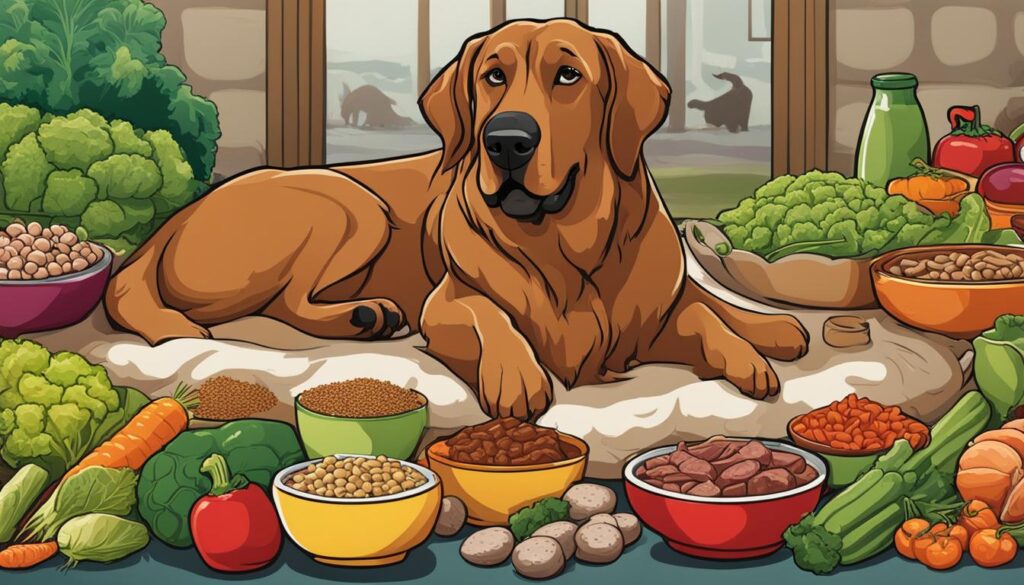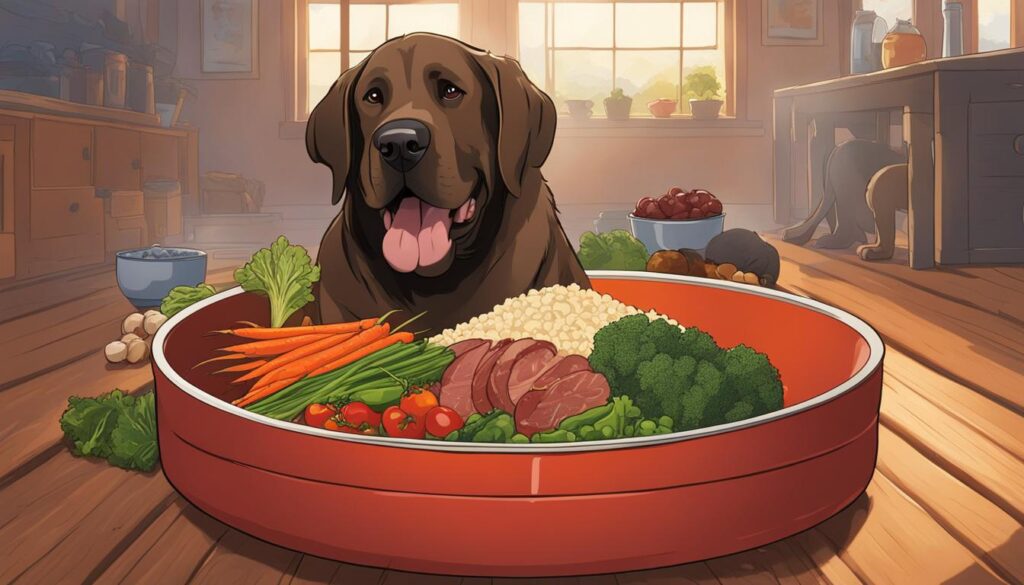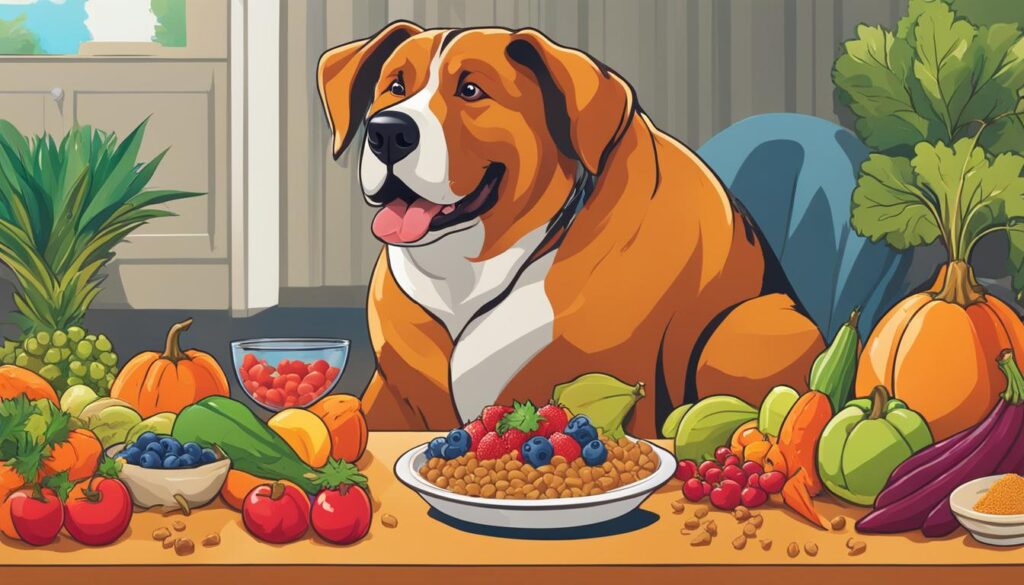As a pet owner, ensuring that your four-legged friend is healthy and happy is a top priority. One of the most critical aspects of achieving this goal is understanding the nutritional needs of your large breed dog. Larger breeds have unique requirements, and meeting them is essential to maintaining their well-being.
Therefore, in this section of our article, we will delve into the nutritional needs of large breeds and provide you with the crucial information you need to know to keep your dog healthy.
We will explore the importance of a balanced diet tailored to large breed dogs, the essential nutrients they require, and how to choose the best dog food options for them. By the end of this section, you will have a good understanding of the essential factors to consider when meeting the nutritional needs of your large breed dog.
Importance of a Balanced Diet for Large Dogs
Large breed dogs require a balanced diet to maintain optimal health. The diet should contain the right amount of protein, fat, and carbohydrates to provide them with energy, support growth and maintain muscle mass.
You can provide your large breed dog with a balanced diet by choosing a high-quality large breed dog food. These dog foods are designed specifically for their nutritional needs and come in various flavors and formulations. Look for a food that contains a high percentage of animal-based protein, as it is key for building and maintaining muscle mass in large breed dogs.
| Nutrient | Recommended Amount |
|---|---|
| Protein | 18-27% |
| Fat | 8-15% |
| Carbohydrates | 40-60% |
It’s important to note that while protein is crucial, overfeeding your dog can lead to health issues such as obesity. Make sure you only feed your dog what it needs, as feeding too much can cause health concerns.
Additionally, it’s important to monitor your dog’s weight and adjust their food intake accordingly. Feeding an appropriate amount of food will help your large breed dog maintain an ideal weight, which can reduce the risk of joint and health issues later on.
In conclusion, a balanced diet is essential to support the overall health and well-being of large breed dogs. By feeding them high-quality large breed dog food, you can ensure they receive the necessary nutrients to live a healthy and happy life. Remember to monitor your dog’s weight and feeding amounts, and consult with your veterinarian for specific dietary recommendations.


Essential Nutrients for Large Breeds
If you want your large breed dog to thrive and stay healthy, it’s crucial to provide them with the essential nutrients they need. These nutrients help support their growth and development, maintain their overall health, and prevent common health problems.
Vitamins and minerals are especially important for large breed dogs. They help support your dog’s immune system, aid in digestion, and promote healthy blood circulation. Some vital vitamins and minerals to include in your dog’s diet include:
| Nutrient | Function | Food Sources |
|---|---|---|
| Vitamin A | Supports vision and skin health | Egg yolks, liver, sweet potato |
| Vitamin D | Strengthens bones and teeth | Cod liver oil, salmon |
| Iron | Helps carry oxygen in the blood | Beef, turkey, lamb, beans |
In addition to vitamins and minerals, omega-3 fatty acids are also essential for large breed dogs. These fatty acids help reduce inflammation, promote healthy skin and coat, and support heart and brain health. Fish oil is a great source of omega-3 fatty acids.
Another important nutrient for large breed dogs is glucosamine, which supports joint health and mobility. Glucosamine can be found in certain types of dog food, but you can also get it in supplement form.
Providing your large breed dog with a balanced diet containing these essential nutrients will help keep them healthy and happy for years to come.


Choosing the Best Dog Food for Large Breeds
When it comes to choosing the best dog food for your large breed, there are a few things to keep in mind to ensure they get the nutrition they need.
What to Look for When Selecting Dog Food
When selecting dog food, look for options with:
- Optimal protein levels: Large breed dogs require a higher amount of protein than smaller dogs, with at least 20% protein in their diet.
- Appropriate calorie content: Large breeds require fewer calories per pound of body weight than smaller breeds, so choose dog food options that take this into account.
- Added nutrients: Look for dog food with added nutrients such as glucosamine and chondroitin for joint health and omega-3 fatty acids for overall health.
Additionally, it is important to feed large breed puppies a specific diet to support their growth and development. Choose puppy food with a lower calorie content and slightly lower calcium to phosphorus ratio to prevent growth issues.
Homemade vs. Commercial Dog Food
Deciding between homemade and commercial dog food can be difficult. While homemade food allows you to have more control over what your dog eats, it can be challenging to ensure they get all the necessary nutrients. Commercial dog food is more convenient and ensures balanced nutrition, but it can be more expensive and may contain fillers or low-quality ingredients.
If you do choose to make homemade dog food, ensure it includes a balanced mix of protein, carbohydrates, and essential vitamins and minerals. Consult with your veterinarian to create the right meal plan for your dog’s needs.
Recommended Dog Food Brands
Here are a few recommended dog food brands for large breeds:
| Brand Name | Rating |
|---|---|
| Blue Buffalo Life Protection Large Breed Adult Chicken and Brown Rice Recipe | 4.5/5 |
| Hill’s Science Diet Large Breed Adult Dog Food | 4.8/5 |
| Purina Pro Plan Large Breed Adult Dry Dog Food | 4.7/5 |
Remember to always choose high-quality dog food options and consult with your veterinarian for specific recommendations based on your dog’s unique needs and health history.


Conclusion
To ensure proper nutrition for your large breed dog, it is crucial to provide them with a balanced diet that meets their unique requirements. Remember that protein requirements for large breeds are higher than for smaller dogs, and their diet should include essential nutrients like vitamins, minerals, and omega-3 fatty acids.
By paying attention to their diet and consulting with your veterinarian, you can help your large breed dog thrive and live a happy, healthy life. With the right nutrition, you can support their growth, maintain joint health, and improve their overall well-being.
So if you want your furry friend to enjoy the best possible health, make sure to prioritize their nutritional needs and create a diet that meets their specific requirements. Your dog will thank you for it!
FAQ
What is the importance of a balanced diet for large dogs?
A balanced diet is essential for large dogs as it provides them with the right nutrients in the correct proportions. This helps support their overall health, promotes proper growth, and prevents nutritional deficiencies.
What are the essential nutrients that large breed dogs require?
Large breed dogs require essential nutrients such as vitamins, minerals, antioxidants, omega-3 fatty acids, and glucosamine. These nutrients play a crucial role in supporting their growth, maintaining healthy joints, and optimizing overall well-being.
How do I choose the best dog food for large breeds?
When choosing dog food for large breeds, look for options that have optimal protein levels, appropriate calorie content, and are specifically formulated for their size and age. Consult with your veterinarian for specific recommendations based on your dog’s unique needs.
Should I feed my large breed puppy a specific diet?
Yes, it is important to feed large breed puppies a specific diet formulated to support their growth. These diets have controlled levels of calcium and phosphorus to promote healthy bone development and prevent issues such as skeletal abnormalities.
What are some benefits of homemade and commercial dog food options?
Homemade dog food allows you to have control over the ingredients and tailor the food to your dog’s specific needs. On the other hand, commercial dog food options are convenient, balanced, and often formulated by experts in pet nutrition. Consider your dog’s individual needs and consult with your veterinarian to determine the best option for your large breed dog.

